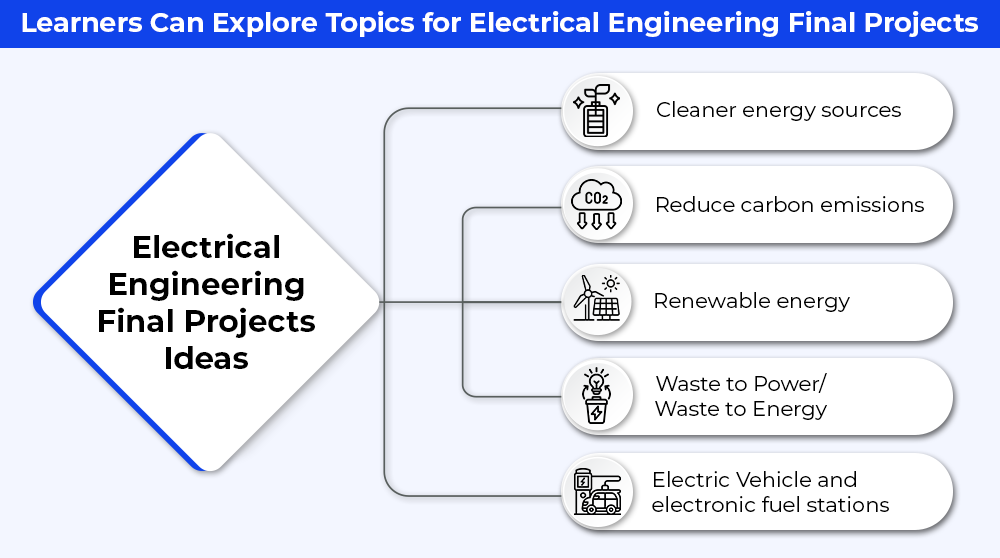Expert Interviews
- University Reviews
- Career Guide
 Video Counseling
Video CounselingImportant Facts
- Ask any Question - CV Forum

Top 10 Electrical Engineering Final Year Projects Ideas
Shalini Adhana Jan 10, 2026 1.2K Reads

The final year projects are significant factors that influence the academic and professional development of a student. Projects offer an opportunity for students to put knowledge into practice and address real-world problems with a creative solution. Electrical engineering is an academic area of study that concerns both the study and implementation of electrical systems and electronic devices, allowing for a variety of meaningful projects.
Students may explore electric energy generation and transmission, electronics, and control systems. Students can also personalize projects particular to their interests when pursuing the development of future engineers, for example, designing microchips or optimizing a large power grid. Projects allow future engineers to improve practice of research and problem-solving skills.
In this blog, we’ll explore the significance of final year projects, popular project ideas, and tips for creating a successful Electrical Engineering project.

Top 10 Electrical Engineering Final Year Project Ideas
Final year projects offer a wonderful opportunity for Electrical Engineering students to relate their theoretical knowledge to real-world problems. Since the world is moving towards smart, sustainable, and connected solutions, the following are 10 top ideas that are extremely relevant, future-oriented, and implementation-friendly:
Smart Energy Meter with Theft Detection
This project entails designing an IoT-enabled smart meter that tracks real-time consumption of electricity. The system identifies unusual patterns of power usage characteristic of energy theft and issues automatic notifications to authorities using cloud-based solutions.
- Key Technologies: IoT, GSM/Wi-Fi, microcontroller (ESP32/Arduino), sensors
- Real-World Application: Beneficial for utility corporations to minimize power theft and enhance billing accuracy.
Automatic Solar Tracking System
Rather than static solar panels, this project creates a system wherein the solar panels track the path of the sun during the day to capture the energy much more efficiently.
- Key Technologies: LDR sensors, Arduino, Servo motors, Renewable Energy
- Impact: Enhances efficiency by 25–40% over fixed panels; can be used in domestic and commercial solar power plants.
Home Automation Using Arduino and Bluetooth
For project work in the final year, electrical engineering students can design an economical home automation system that allows users to operate fans, lights, and other devices remotely using a mobile phone through Bluetooth.
- Major Technologies: Arduino UNO, HC-05 Bluetooth module, Relay circuits
- Advantages: Energy saving, improved home security, and user convenience.
Design of Electric Vehicle (EV) Charging Station
This project aims to design a prototype EV charging station with such features as voltage regulation, user verification, and metering of use.
- Important Technologies: Power electronics, microcontrollers, smart sensors, HMI
- Relevance: As India's EV market grows, this prototype is useful in analyzing the operational structure of next-generation smart EV infrastructure.
Overvoltage and Undervoltage Protection System
Design a protection circuit that can automatically shut off appliances upon voltage fluctuation to avoid damaging sensitive electronics.
- Important Technologies: Voltage sensors, relay modules, microcontrollers
- Usage: Suitable for home and industrial use where grid stability is an issue.
Induction Motor Speed Control with VFD (Variable Frequency Drive)
The project illustrates the application of VFDs in controlling AC induction motor speed to provide energy efficiency and accurate control.
- Important Technologies: VFD controllers, MATLAB simulation, motors
- Applications: Widely implemented in HVAC systems, conveyor belts, and industrial automation.
IoT-Based Transformer Health Monitoring System
Students develop a remote transformer monitoring system that monitors critical parameters such as oil temperature, load current, and insulation condition.
- Key Technologies: IoT, sensors, cloud database, mobile app
- Significance: Averts disastrous transformer failures in substations and enhances preventive maintenance.
Wireless Power Transfer System
This project investigates near-field magnetic resonance coupling for the transmission of electrical power wirelessly over short distances.
- Key Technologies: Coils, Resonant circuits, Power amplifiers
- Use Cases: Wireless phone charging, contactless power supply in medical devices, and electric toothbrushes.
Smart Street Lighting System
Design a lighting system that switches on automatically under dim light or on detecting motion, saving power by reducing brightness in the absence of movement.
- Key Technologies: LDR, PIR sensors, Arduino
- Impact: Saves electricity, cuts down operational expenses for municipalities, and increases urban sustainability.
Microgrid Design with Renewable Sources
Develop a miniaturized microgrid that integrates sun power and wind power with energy storage technologies. The system can work standalone or in parallel with the central power grid.
- Major Technologies: Solar panels, Wind turbines, Batteries, Inverters
- Advantages: Provides power reliability to remote locations; facilitates green energy consumption and disaster mitigation.
Why Are Final Year Projects Significant?
Final year projects act as the connecting link between theoretical knowledge and industry requirements. Here's why they matter:
- Practical Application: They enable students to bring theoretical ideas into practice to address real-world problems.
- Development of Skills: Foster innovation, critical thinking, collaboration, and project management.
- Professional Progress: Provides high value to your CV and increases your chances of getting recruited or accepted into higher education.
- Readiness for Industry: Provides information on tools, technologies, and workflows employed in industry.
Most Popular Areas for Electrical Engineering Projects
Electrical Engineering is wide, and the topics of the project can range across different sub-disciplines. Some popular areas are:
- Power Systems
- Control Systems
- Renewable Energy
- Automation and Robotics
- Embedded Systems
- Internet of Things (IoT)
- Electric Vehicles (EV)
- Smart Grids
- Microcontrollers and Microprocessors
- Energy Management Systems
Real-World Benefits of Final Year Projects
Numerous students have used their final year projects to:
- Startup Ideas
- Research Publications
- Patent Applications
- Job Opportunities
- Postgraduate Research Topics
With newer technologies such as smart grids, EVs, and AI in electrical engineering, your project can help alleviate real-world energy issues.
Tips on Selecting the Proper Final Year Project
Selecting the proper project will determine the quality and enjoyment of your final year of life. The following are some tips:
- Follow Your Interest: Select a subject that truly interests you.
- Assess Feasibility: Ensure that you have the right tools and resources.
- Industry Relevance: Select problems that are currently pertinent in the marketplace.
- Mentor Support: Collaborate under a faculty or industry mentor who can offer guidance.
- Team Collaboration: Select a project that fosters teamwork and shared accountability.
Tools and Software that are Popular
Electrical Engineering projects frequently require both theoretical insights and practical technical skills. To effectively implement and emulate practical real-life applications, students and professionals employ a vast range of software tools and platforms. These software tools not just assist in designing and testing the system in an efficient manner, but also fill the gap between theory and practical implementation. A closer examination of some of the most widely used software and tools in Electrical Engineering follows:
MATLAB/Simulink
MATLAB finds extensive application in analyzing intricate electrical systems, designing control systems, power system analysis, and signal processing. Simulink, as a tool built on MATLAB, offers a graphical user interface for multi-domain simulation. Engineers utilize it in order to test system designs prior to hardware implementation, thereby saving time and lowering errors in high-scale electrical projects.
AutoCAD Electrical
AutoCAD Electrical is designed especially for electrical control systems. It automates tasks such as wire numbering, component labeling, and bill of material generation. Guarantees precision in electrical panel design and documentation for industrial and infrastructure applications. Used extensively in manufacturing and plant engineering.
Proteus/Multisim
Proteus is commonly used for simulation of microcontroller-based embedded systems using microcontrollers like Arduino or PIC. Multisim is commonly employed for designing and verifying analog and digital circuits. Both packages enable engineers to simulate and test component-less circuits, allowing them to debug and saving them thousands of hours and dollars in prototyping.
Arduino / ESP32 Platforms
Arduino boards are easy to handle and ideal for controlling LEDs, motors, sensors, and IoT devices. ESP32 provides Wi-Fi and Bluetooth for advanced IoT applications. These platforms enable rapid transfer of ideas into working prototypes, which is critical in the current electrical and electronics projects involving automation and networking.
Programming Languages like Python / C++
Python finds the most applications in data analysis, AI/ML interfacing, and Raspberry Pi implementations. Time-critical and resource-hungry applications such as real-time microcontroller programming are best done with C++. Coding lies at the center of contemporary electrical systems—be it a smart grid controller, a robotic system, or a plain sensor node.
Conclusion
Final year projects in Electrical Engineering are not just academic requirements. They are a gateway to a bright career in engineering. With the right concept, adequate planning and competent effort, you could produce a project that highlights your technical capabilities and makes a difference. Whether you intend to work in industry, start your own business, or go on to research, your project is not only a step in that direction, it will surely be the first of many successes.
FAQs (Frequently Asked Questions)
Final year projects provide practical exposure of actual problems and allow students to implement theoretical concepts. They are crucial for the development of problem-solving skills, technical skills, collaboration, and innovation, which are necessary for professional growth.
Hot topics for projects are new industry requirements and emerging sustainability trends:
- Smart Energy Meters using IoT
- Electric Vehicle Charging Stations
- Microgrid Integration with Renewable Energy
- Home Automation using Arduino
- Transformer Health Monitoring System
Yes, students can do so, but universities prefer team projects (2–4 students) so that learning through group work occurs, as in actual workplaces. However, the scope and complexity of individual project work are generally less.
Yes, most companies welcome students who work on relevant and industry-specific projects. A good project can lead to internship proposals and even pre-placement offers (PPOs) sometimes.
Commonly used tools are:
- MATLAB/Simulink
- AutoCAD Electrical
- Proteus or Multisim
- Arduino/ESP32 platforms
- Python or C++ for programming and automation
Consider the area of interest, like power systems, electronics, control, etc., current industry trends, availability of resources, and future career aspirations. Consult with mentors, teachers, and working professionals to get ideas based on your interests.
Yes, open-source software such as Arduino IDE, Raspberry Pi OS, and KiCAD is used by many students. The software or hardware fulfills the technical requirements of the project and is approved by the institute.
Yes. Research-based projects are liked by some students, especially if they are choosing M.Tech or a research area. These kinds of projects focus on innovation and theory building.

6 Years of Experience/ Storyteller / Research-driven Writer
As a Technical and Academic Writer, I write engaging and SEO-optimized content to reach the right audience.
Every query is essential.
Our team of experts, or experienced individuals, will answer it within 24 hours.
Recommended for you
Tired of dealing with call centers!
Get a professional advisor for Career!
LIFETIME FREE
Rs.1499(Exclusive offer for today)

Pooja
MBA 7 yrs exp

Sarthak
M.Com 4 yrs exp

Kapil Gupta
MCA 5 yrs exp
or



Career Finder
(Career Suitability Test)
Explore and Find out your Most Suitable Career Path. Get Started with our Career Finder Tool Now!
ROI Calculator
Find out the expected salary, costs, and ROI of your chosen online university with our free calculator.
